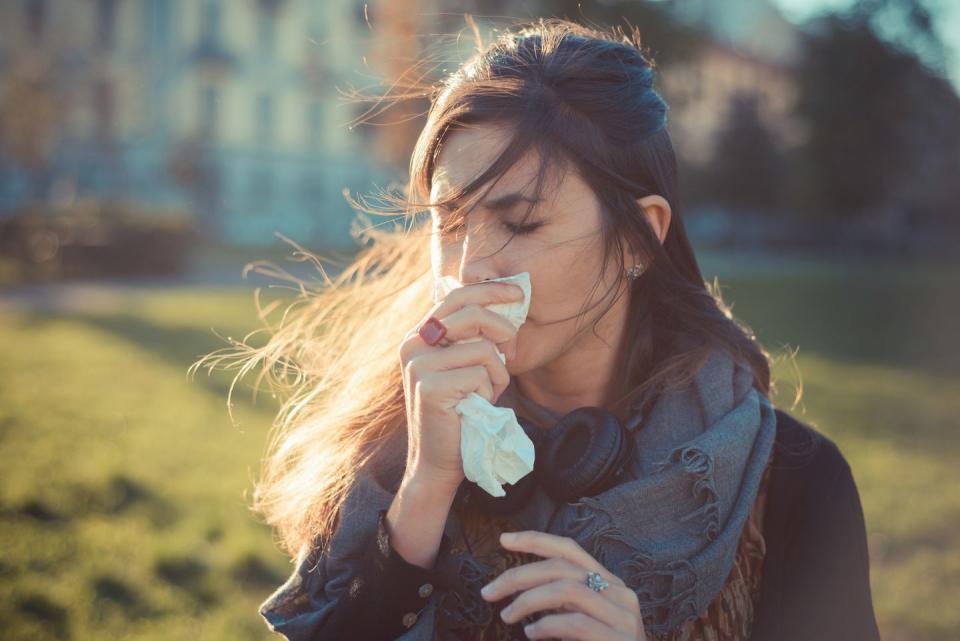There Are Two Main Reasons Why Your Nose Won't Stop Running

Runny noses aren’t just a kid thing, but still, all these years later you probably remember your mom swooping in with a tissue before you dabbed the drip with your sleeve.
Annoying, yes, but keep in mind that your snot (like your mom!) is only trying to help — mucus is your first line of defense when you inhale a germ or irritant, as we all do with every breath. “The entire nasal passage is lined with glands that produce mucus continuously — mucus is necessary to keep the membranes moist and protect the body from infection or injury,” says Andrew Lane, M.D., the director of the Johns Hopkins Sinus Center in Baltimore.
When a microorganism, a dust particle or tiny piece of arts-and-crafts glitter tries to get into your body via your schnoz, sticky mucus (mostly water, proteins and sugars) ensnares it. Then the little hairs in your nose move it along toward your throat, you swallow it, and it winds up getting digested in your stomach without you even noticing, Dr. Lane explains.
But when the invader is a viral infection (say, cold or flu), or bacterial infection, or something that causes you to have an allergic reaction, your immune system kicks into gear, and so does your mucus production. “The membranes in your nose may start to swell up, and you’ll see more mucus,” says Tochi Iroku-Malize, M.D., MPH, a family physician on Long Island, N.Y., and the president of the American Association of Family Physicians. It might start to get thicker and goopier, because your immune system is sending proteins to try and fight the invader, she says. “Some of these proteins also give the mucus color.”
We usually think of a runny nose (as opposed to a stuffy nose) as more of the watery type of discharge, which is produced by glands toward the front of the nose, says Dr. Lane. But you can have both a runny and a stuffy nose, in case you haven’t noticed. “Inflammation from colds and sinusitis can cause a thicker drainage to be produced from further back in the nose and sinuses,” he says.
Why won't my nose stop running?
“There are two major reasons people will have a runny nose,” says Dr. Iroku-Malize. “Either they have an infection caused by a virus or bacteria, or they have allergies—those are the two most common reasons.”
But your nose can also sometimes start to run because you’ve gotten a whiff of something strong, inhaled smoke, are breathing polluted air or if you’ve eaten something spicy. “The nasal passages also have abundant nerve endings that sense the environment and help regulate the amount of mucus production and the speed of mucus movement,” Dr. Lane says. “For example, if dryness is sensed, the nerves will stimulate the glands to step up mucus production.”

That’s why cold air (which is dryer than warmer air) can turn on the tap. “Also, when the nerves are irritated by something that has been breathed in, this may cause more rapid mucus production and movement to wash away the offending agent, sometimes also provoking a sneeze reflex to blow it out of the nose.” (Think, sneezing when you sniff too much pepper.)
How do I stop a runny nose fast?
There are a few ways you can dry up a runny nose.
Over-the-counter meds:
Decongestants, which lower the production of mucus. “But with decongestants we have to be careful,” says Dr. Iroku-Malize. These drugs work by shrinking the blood vessels in your nose, she says, but they also shrink other blood vessels, which can cause blood pressure to rise. “If you have high blood pressure, you shouldn’t be taking them,” she says.
Nasal steroid sprays. These can help if you have allergies that inflame your nasal passages, causing runniness.
Antihistamines. This class of drugs blocks the body chemical histamine from making you stuffy and sneezy to expel the allergen, explains Dr. Iroku-Malize. But know that these meds can make you spacey and drowsy.
A combo drug, such as an antihistamine plus a decongestant. Some people need both, but try to pick a formulation that targets your problem specifically — if you can get away with one or the other, that’s ideal. “At the end of the day, it’s best to try not to take anything you don’t need,” she says.
Home remedies and natural options:
One of the reasons for extra mucus production (and liquid dripping out of your nose) is that your body is working hard to keep the inside of your nose moist. If you pick up the slack, “The body doesn’t need to produce as much mucus, because you’re keeping your nose and throat moist,” says Dr. Iroku-Malize. There are lots of options here.
An over-the-counter saline spray. They are designed to lubricate your nasal passages if you're a bit dry.
A neti pot. Neti pots are mini, specially built teapot-like vessels that let you irrigate your nostrils and flush out nasty stuff with a saline mix. “These are good as long as it’s done safely,” she says. “Used distilled water or water that’s been previously boiled, so you’re not introducing anything into the noise.” You can buy pre-packaged saline to add to the water, or ask your doctor how to make your own, she says.
A humidifier. This adds moisture to the air you’re breathing in and helps keeps your nose and throat moist. Check out the Good Housekeeping Institute's top picks.
A hot shower during which you can breathe in the steam. You can also steam up your bathroom with a hot shower and just sit in the steam (a safer option for kids).
Steamy beverages. The steam from the tea or soup can moisten the inside of your nostrils, reducing the need for your body to crank out mucus. Bonus: you’ll stay hydrated, especially important if you have a virus or other infection. Just don’t make it a hot toddy, advises Dr. Iroku-Malize, as alcohol is dehydrating.
How long does a runny nose last?
That depends on why your nose is running. If your nose is dripping from the nerves in your nose being stimulated or because you’ve come in from the cold, it should stop as soon as things go back to normal.
Colds and other viruses tend to last around seven to 10 days, says Dr. Iroku-Malize, and your runny nose might stick around that whole time, until the infection is run its course. The same goes for a bacterial infection, although your doctor might prescribe antibiotics to speed it along.
But if your runny nose is a symptom of allergies, it’ll keep running as long as you’re exposed to the allergen. “An allergy causes your immune system to overreact to something harmless, like pet dander or grass,” says Dr. Iroku-Malize. In so doing, it releases the chemical histamine, which causes you to get stuffy and runny, your body’s way of trying to “get rid” of the substance.
When to see a doctor:
Usually when you have a runny nose it comes out of both nostrils, says Dr. Lane. “Definitely see a doctor if there is a large amount of drainage just from one side of the nose,” he says. It’s very uncommon, he says, but if someone is dripping watery, clear liquid from just one side, it can be a leakage of cerebrospinal fluid, and is a 911-worthy emergency. Another rare reason for a runny nose is a nasal tumor.
For the vast majority of us, whose runny nose is caused by a virus or a bacterial infection, see a doctor if it hasn’t faded in a week or 10 days, says Dr. Iroku-Malize. “Another reason to see the doctor is if you improved and then all of a sudden your symptoms started to worsen again — it may be that you used to have a viral infection, but now you have a superimposed bacterial infection,” she says. In that case, you’ll likely be given antibiotics.
And if your nose keeps running for months or years for no obvious reasons, says Dr. Lane, you may have vasomotor (nonallergic) rhinitis, which is a chronic runny nose when you don’t have any kind of infection or allergy. For that, he says, you may be prescribed a nasal spray that blocks your glands from making mucus, or undergo an in-office procedure to treat the overactive nerves that are prodding the glands to crank out the stuff.
The bottom line:
Most runny noses go away on their own or with over the counter meds but keeping your nasal passages and the air you breathe moist can also prevent overproduction of mucus.
You Might Also Like


